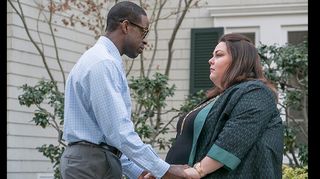Broadcast Fights Its Way Back Into Emmy Talk

Not that many years ago, the small handful of streaming shows earning Emmy nominations—House of Cards, Orange Is the New Black—made for an intriguing story. These days, the very short list of broadcast series popping up in Emmys discussions—This Is Us, The Good Place—merits its own story, too.
But thanks to rookie smash This Is Us, broadcast has a shot at winning Outstanding Drama for the first time since 24 took home the prize way back in 2006. Last year’s best drama nominations featured FX’s The Americans, AMC’s Better Call Saul, PBS’ Downton Abbey, HBO’s Game of Thrones, Showtime’s Homeland, Netflix’s House of Cards and USA’s Mr. Robot. Game of Thrones won the past two years, and Breaking Bad the two years before that.
Pundits believe the NBC drama should at least pick up a nomination. “This Is Us shows you can do a quality show and appeal to a large audience,” David Bianculli, National Public Radio TV critic and founder of TVWorthWatching.com, said.
Emmy voting finishes June 26 and nominations are announced July 13. Other broadcast shows popping up in Emmy chats are NBC comedy The Good Place and ABC comedy Black-ish. Broadcast has traditionally done better in the comedy category than the drama one. Last year’s comedy finalists were ABC’s Black-ish and Modern Family; Netflix’s Master of None and Unbreakable Kimmy Schmidt; HBO’s Silicon Valley and Veep; and Amazon’s Transparent. Veep won for the second year in a row, after Modern Family won for five years running.
Another show that gets frequent mentions in these discussions is The Good Fight, the spinoff of The Good Wife. No one is exactly sure whether it should be classified as a broadcast show, as The Good Fight premiered in February on CBS, with the rest of the 10-episode season streaming on CBS All Access.
Putting the Broad in Broadcast
Close watchers of television offer a variety of reasons why broadcast has fallen so far in the awards race. “I see broadcast shows as being broad, while the shows that are more niche tend to clean up at awards time,” Rob Owen, Pittsburgh Post-Gazette TV critic, said.
Broadcasting & Cable Newsletter
The smarter way to stay on top of broadcasting and cable industry. Sign up below
Bianculli describes the broadcast philosophy as reaching the most people possible while offending the fewest. It makes for a lot of “big, bland shows,” he said.
Chris Beachum, managing editor at awards website Gold Derby, notes the high number of broadcast spinoffs, such as the Law & Order and CSI franchises, that dulled the sector’s luster over the past couple of decades. “After a while, voters and critics moved on,” he said, “because the shows were not fresh and new.”
The streaming services are all about giving their creators “complete freedom,” he added.
House of Cards in 2013 became the first Emmy-nominated streaming show. The streamers have greatly increased their For Your Consideration campaigns since then. Netflix had its own rented event space in Beverly Hills, Calif., holding around two dozen events to promote its shows for Emmy consideration. FX Networks and FX Productions president John Landgraf described the campaigns to The New York Times as “10 times crazier” than they used to be.
The subscription video-on-demand players’ campaigns aim to beat out cable networks such as FX and HBO. It’ll be some time, if it happens at all, before broadcast returns as a major factor during awards season.
Bianculli noted how ratings are but part of the equation now as to whether a show gets to stay on the air. With the Nielsens less of an issue, perhaps that means we’ll see the broadcast networks start to make the bold, brave, niche-y stuff that earns Emmys?
“The only time networks take a chance is when they are forced to; when they have little to lose,” Bianculli said. “That sounds like broadcast TV to me in 2017.”
Michael Malone, senior content producer at B+C/Multichannel News, covers network programming, including entertainment, news and sports on broadcast, cable and streaming; and local broadcast television. He hosts the podcasts Busted Pilot, about what’s new in television, and Series Business, a chat with the creator of a new program, and writes the column “The Watchman.” He joined B+C in 2005. His journalism has also appeared in The New York Times, The Philadelphia Inquirer, Playboy and New York magazine.

